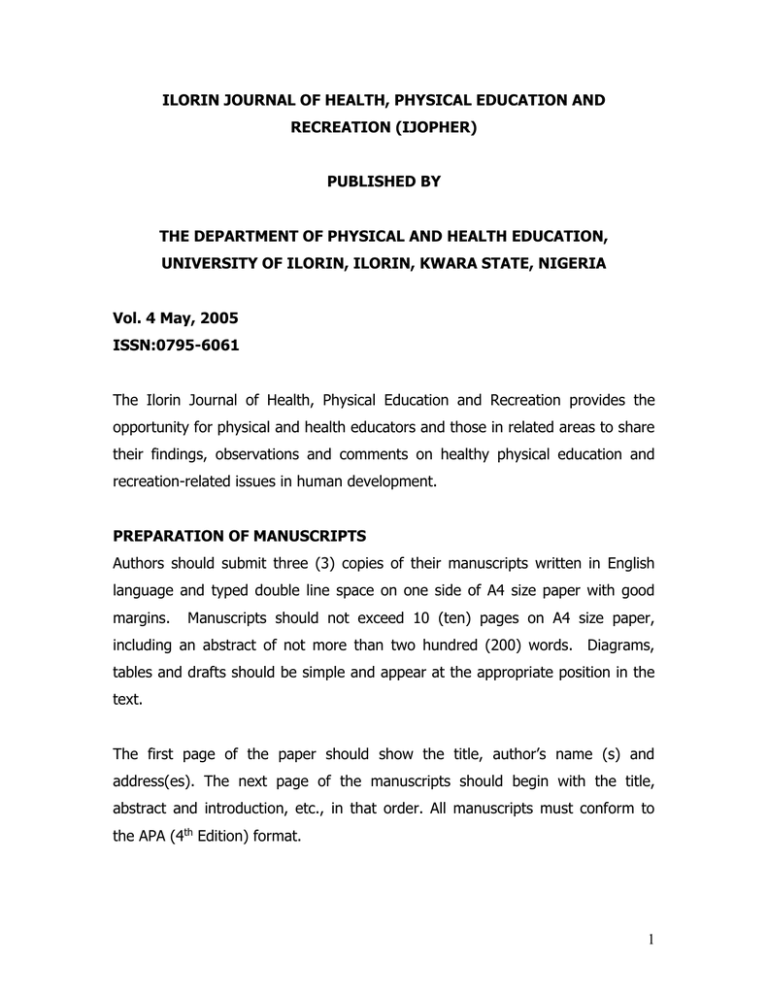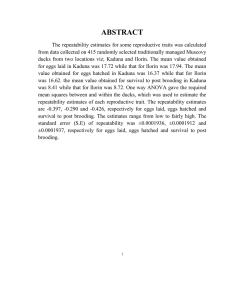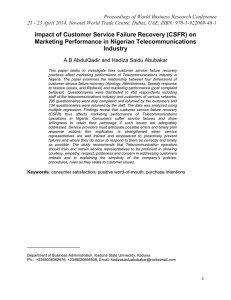ILORIN JOURNAL OF HEALTH, PHYSICAL EDUCATION AND RECREATION (IJOPHER) PUBLISHED BY
advertisement

ILORIN JOURNAL OF HEALTH, PHYSICAL EDUCATION AND RECREATION (IJOPHER) PUBLISHED BY THE DEPARTMENT OF PHYSICAL AND HEALTH EDUCATION, UNIVERSITY OF ILORIN, ILORIN, KWARA STATE, NIGERIA Vol. 4 May, 2005 ISSN:0795-6061 The Ilorin Journal of Health, Physical Education and Recreation provides the opportunity for physical and health educators and those in related areas to share their findings, observations and comments on healthy physical education and recreation-related issues in human development. PREPARATION OF MANUSCRIPTS Authors should submit three (3) copies of their manuscripts written in English language and typed double line space on one side of A4 size paper with good margins. Manuscripts should not exceed 10 (ten) pages on A4 size paper, including an abstract of not more than two hundred (200) words. Diagrams, tables and drafts should be simple and appear at the appropriate position in the text. The first page of the paper should show the title, author’s name (s) and address(es). The next page of the manuscripts should begin with the title, abstract and introduction, etc., in that order. All manuscripts must conform to the APA (4th Edition) format. 1 An assessment fee of five hundred naira only (N500.00) or ten dollars ($10.00) must accompany the manuscripts. All correspondence concerning manuscripts and editorial matters should be addressed to either. Dr. A.E. Talabi Dr. Kola Lafinhan Managing Editor, Editor-in-Chief, C/o Dept. of Physical C/o Dept. of Physical & Heath Education, & Health Education University of Ilorin, University of Ilorin, P.M.B. 1515, P.M.B. 1515, Ilorin. Ilorin. Editorial Board Editor-in-Chief - Dr. Kola Olafinhan Managing Editor - Dr. A.E. Talabi Assistant Editor - Mr. O.T. Ibrahim Board Members - Prof. L. Emiola Prof. E.A. Ogunsakin Dr. A. a. Adesoye Dr. O. Obiyemi Dr. O. Oyerinde Consulting Editors - Prof. J.A. Adedeji Prof. F. Amuchie Prof. C.O. Udoh Editorial Note The Ilorin Journal of Health, Physical Education and Recreation (IJOPHER), is out with a new look and a new mandate. We dare our contributors to send scholarly articles to our journal and in return we will produce a quality journal. 2 Table of Contents Editorial Note 1. Home-based Approach for Managing the Woman Affected by HIV/AIDS: Implications for Health Education and Promotion. Ibrahim A. Njodi & David. W. Bwala 2. Sexual Behaviour and Contraceptive Practices among Pre-marital Adolescent Students in Ondo Metropolis-J.O.Fawole,C.F. Akinnubi (Mrs)& J.A.Adegboyega 3. Efficacy of Partitioned Pyramidal Structure of Sports Programme for High Performance in Nigeria – A. 1 Kabido 4. Prospects and Problems of Indigenous Soccer Coaches in Nigeria- Toro Abayomi 5. Physical Fitness Lifestyle among Public Servants in Ekiti State, Nigeria J.A. Adegun 6. Parental Practice and Food Preference of Parents and School Children in Ilorin LGA of Kwara State – Oyerinde, O.. & Owojaiye, Sunday Oni 7. A Comparative Analysis of College Athletes Performance in Two Separate Muscular Endurance Tests –.B. Ajayi-Vincent O 8. Perceived Consequences of Corporatistic Model of Organisation of Sports for Sports Development in Nigeria – Mohammed Baba Gambari 9. A Comparative Study of Attitudes of Secondary School Teachers towards the Teaching of Physical Education in Ilorin East LGA – Bakinde, S.T. 10. Socio-cultural Perspectives of Sports Participation – S.O. Babatunde 11. Dietary Attitude University of the university Ilorin Athletes Onifade, Dominic, O.L. (Mrs.) O.A. 12. Student’s Perception of Examination Malpractice –Nman Alhaji Habeeb 13. Knowledge of AIDS among Athletes in Ilorin Metropolis - S.O. Oniyangi 3 14. Attribution of Maternal Mortality by Women from High and Low Socioeconomic Status in Southern States of Nigeria – Daisy Dimkpa 15. Oral Hygiene Practices and Prevalence of Dental Cares among School Children in Oyo State-Olaitan O.Lanre 16. Attitude of College of Education Lecturers to their Professional Roles and Duties B.U. Akano & A.T. Akinsola. 17. Sexual Harassment among Athletes in Higher Institutions in Ilorin, Kwara State-Tajuden Olanrewaju Ibraheem & Bola, O. Ogunsanwo. 18. Disabilities in Children: A Perspective – C.O. Adegbite 19. Bicycling: A Sport that Threatens Manhood –.O. B Asagba 20. Physiological Effects of Havard Bench Steps as Regular Aerobic Exercise Training Programme in the Treatment of Insulin-dependent Diabetics. – Gwani, J.A. & Muhammad M.S. & Chado. 21. Relationship between Lifestyles and Health Problems Suffered by the People of Kaduna State – Shehu Raheem Adaramaja & Comfort O. Adegbite. 22. Recruitment of Volunteers as Aids to the Adapted Physical Educators in Nigeria Schools for the Handicapped – K. Lafinhan 23. Mental health for Job Demands among Nigerians: The Place of Health Education and Consultation Programmes – T.I. Izevbigie 24. The Interplay of Health Lifestyles in the Control of Osteoposis E. Agwubike 4 RELATIONSHIP BETWEEN LIFESTYLES AND HEALTH PROBLEMS SUFFERED BY THE PEOPLE OF KADUNA STATE By Shehu Raheem Adaramaja Department of physical and health education University of Ilorin & Comfort O. Adegbite Institute of Education Ahmadu Bello University, Zaria ABSTRACT The study examined the relationship between lifestyles and health problems suffered by the people of Kaduna State. Diseases associated with unhealthy lifestyles accounted for between 8-10% health-related problems in the rural areas and 10-12% in the urban communities of Nigeria. A visit to government and private health institutions in Kaduna State shows a large number of individuals suffering from diseases relating to unhealthy lifestyles of smoking, alcohol consumption, sedentary lifestyles, poor nutritional habit, drug habit and indiscriminate sexual behaviour. Descriptive research design was adopted for the study. A total of 1350 respondents were randomly selected from the three (3) senatorial districts of Kaduna State through the stratified random sampling technique. A research instrument developed and designed by the researchers and pilot tested was used to collect relevant information for the study. The data that emanated from the study were analysed using Spearman Brown rank-order correlation coefficient and chi-square (X2) test of relationship. The results revealed that health problems suffered by the people of Kaduna State are significantly related to their smoking habit, alcoholic lifestyle sedentary lifestyle and sexual behaviour, The authors recommended ,among others, that in an attempt to reduce sedentary lifestyle complications of obesity, hypertension, overweight and diabetes common among the people of Kaduna State, and local government councils should, as a matter of urgency, be encouraged to establish and run weight reduction or fitness centres for the inhabitants, since they say “prevention is better than cure”. 5 Introduction The individual lifestyles and health habits constitute what he does and what he fails to do, ranging from smoking, physical inactivity or sedentary lifestyles, alcohol consumption, nutritional habit and indiscriminate sexual behaviour. The World Health Organisation (WHO) (1993) reported that there is a strong negative relationship between peoples mortality rates and lifestyles practices. This has serious negative consequences on the nation’s health status and survival. For example, the World Health Organisation (2002) rated the Nigerian health care system as one of the worst five in the world, i.e’ it placed Nigerian health care system in the 187th position out of 191 member countries of World Health Organization. The reason advanced for this is that there is growing incidence of such non-communicable diseases like hypertension, coronary heart diseases, diabetes, obesity, cancer and stress-related diseases among Nigerians due to unhealthy lifestyles. The report stated that 3.5 millions of Nigerians have mild hypertension, 1.2 million have moderate and 0.5 million have severe hypertension. The prevalence of cardiovascular diseases, obesity, diabetes and other health-related problems due to unhealthy lifestyle is generally estimated at 8-10% for rural and 10-12% for urban communities in Nigeria. The concept of lifestyle is based upon such factors as individual’s personality, cultural heritage, family, education, income environment and occupation. A person’s lifestyle is a pattern of such individual’s behaviour knowing how an individual behaves in one area of his life provides a strong indication of what he might do in other segments of his life (Burada, 1994). Agbaso (1998) and Jenks (1993) reported that the lifestyle of any country or society attests to their way of life, or mode of life or culture of that particular society or people. Thus, the lifestyle of any society is reflected in the mode of behaviour, habits, diet, dressing and language, etc. of its people. An epidemiological shift is being witnessed recently due to changes in life conditions including reduction in life expectancy occasioned by unhealthy lifestyles, creating 6 a burden of communicable and non-communicable diseases in many countries of the world (Dishman and Sallis, 1994, WHO 1998 and Molarious, 2003). Lifestyles are neither good nor bad. Societies judge their worth and potentials according to their support and maintenance of the social system. Because of this, some lifestyles are seen as highly desirable and virtuous while others are considered destructive or pathological (Larbi, et al, 1993 and Douglas, 1978). Alcoholism is in the later category, for the alcoholic individual tends to neglect his responsibility to others. He forces society to take care of him, to tolerate his self-destructive behaviour and to restrict him for activities, which might be of potential harm to others. Healthy lifestyle or positive health behaviour of exercise, good diet, nonsmoking, non-alcohol consumption, avoidance of casual or indiscriminate sex and drug abuse can help to prevent obesity, diabetes, high blood pressure, stress, spread of sexually-transmitted diseases, including hepatitis ‘B’, HIV/AIDS and early mortality. On the other hand, unhealthy lifestyle(s) or behaviour might have direct and indirect consequences for the health and well-sbeing of the individual. For instance, excessive eating or loss of appetite may lead to problems of malnutrition (obesity or undernutrition). Hyperactivity, excitability and restlessness resulting from drug taking may lead to accidents and untimely deaths; alcoholism and smoking may lead to other social vices. The main thrust of this study was to examine the relationship between adopted lifestyles and health problems suffered by the people of Kaduna State. The major hypothesis for this study presumed that, the health problems suffered by the people of Kaduna State are not significantly related to their adopted lifestyle. Specifically, the researchers tested the following sub-hypotheses: (a) Healthy problems suffered by the people of Kaduna State are not significantly related to their smoking habit. (b) Health problems suffered by the people of Kaduna State are not significantly related to their sedentary lifestyle. 7 (c) Health problems suffered by the people of Kaduna State are not significantly related to their sedentary lifestyle. (d) Health problems suffered by the people of Kaduna State are not significantly related to their nutritional habit. (e) Health problems suffered by the people of Kaduna State are not significantly related to their drug habit. (f) Health problems suffered by the people of Kaduna State are not significantly related to their sexual behaviour. METHODOLOGY Descriptive research design was adopted for this study. This is because relevant information required for the study was already available. The population consists of all individuals from age 16 years and above living in both rural and urban areas of Kaduna State. A total of 1350 respondents were randomly selected from the three (3) senatorial districts of Kaduna State through random sampling technique. A structured research instrument developed and designed by the researchers and pilot tested was used to collect relevant information for the study. The questionnaire administration was done by the researchers and four (4) other research assistants and interpreters. The data that emanated from the study were analysed using appropriate descriptive statistics and inferential statistics of Spearman Brown rank-order of correlation coefficient and chi-square (X2) test of relationship. The results are presented as follows: 8 Table 1: Spearman ‘rho showing the relationship between health problems and lifestyles of the people of Kaduna State LIFESTYLES FACTORS Health Problems 1. Cough cancer, lung problems Smoking habit (1) Alcoholic lifestyle (2) Sedentary lifestyle (3) Nutritional lifestyle(4) Drug habit (5) Sexual behaviour (6) Corrl: coeff 487** 650** .100** .343** .548** .59** Signi(2 .000 .000 .000 .000 .000 000 tailed) 1350 1350 1350 1350 1350 1350 2. Liver problem, accident, hypertension 3.High blood pressure, overweight, diabetes, depression, obesity 4. Loss of appetite, cardiovascular diseases, malnutrition 5. Hallucinogenic reaction, anxiety, liver damages, violence 6. HIV/AIDS, STDs, Abortion, Rape, Teenage pregnancy ** Correlation is significant at the 0.01 level (2 tailed) * Correlation is significant at the 0.05 level (2 tailed) Table 1 shows that the hypothesis is significant at 0.000 and at 0.01 alpha level of significance. Therefore, the null hypothesis that says that the health problems suffered by the people of Kaduna State is not significantly related to their adopted lifestyles is rejected. The inferences that can be deduced from the table are as follows: (a) Health problems suffered by the people of Kaduna State are significantly related to their smoking habit. (b) Health problems suffered by the people of Kaduna State are significantly related to their alcoholic lifestyle. 9 (c) Health problems suffered by the people of Kaduna State are significantly related to their sedentary lifestyles. (d) Health problems suffered by the people of Kaduna State are significantly related to the drug habit. (e) Health problems suffered by the people at Kaduna State are significantly related to their sexual behaviour. In order to test the validity of the results generated through the spearman-rank-order correlation coefficient, the data collected were also analysed using chi-square (X2) test. Table 2: Chi-square (X2) showing the relationship between health problems and smoking habit of the respondents Questions Yes % No % 417 30.9 895 66.3 a. Cough 166 12.3 b. Cancer 71 5.3 c. 50 3.7 d. Redness of lop 77 5.7 e. Chest pain 41 3.0 f. 62 4.6 g. Others 3 0.2 h. No response 880 65.2 1. Do you smoke? No resp. 38 % 8 Total X2 1350 2. Do smokers experience any of these as a result of smoking Lung problem All of the above Total 1350 100 1350 885.36 X2 = 885.36, df = 14, critical value = 23.68, P < 0.05 Table 2 shows that the calculated X2 value of 885.36 is greater than the critical value of 23.68 at 0.05 alpha level of significance. Therefore, the null hypothesis that says health problems suffered by the people of Kaduna State is not significantly related to their smoking habit is rejected. This means that health problems suffered by people of Kaduna State are significantly related to their smoking habit. 10 Chi-square (X2) showing the relationship between Table 3: health problems and alcoholic lifestyle of the respondents Questions Yes % No % No % Total X2 resp. 1. Do you drink alcohol? 653 48.4 (a) Liver problem 97 7.2 (b) Accident 97 7.2 (c) Problems of adjustment 108 8.0 (d) Obesity 64 4.7 uneasiness 210 15.6 (f) All of the above 35 2.6 (g) Others 9 0.7 (h) No response 730 54.1 1350 100 649 48.1 48 3.6 1350 2. Do alcohol drunkers experience any of these as a result of alcohol consumption? (e) Personality disorder and social Total 1350 885.36 X2 = 796.32, df = 14, critical value = 23.68, P < 0.05 A careful examination of table 3 shows that the calculated x 2 value of 796.32 is greater than the critical value of 23.68 at 0.05 alpha level of significance. Therefore, the null hypothesis that says health problems suffered by the people of Kaduna State is not significantly related to their alcoholic lifestyle is rejected. This means that health problem suffered by the people of Kaduna State are significantly related to their alcoholic lifestyle. 11 Table 4: Chi-square showing the relationship between health problems and sedentary lifestyle of the respondents. Questions Yes % No % No % Total X2 resp. 1. Do you participate in physical 1160 85.9 (a) High blood pressure 256 19.0 (b) Cardio vascular disease 52 3.9 (c) Obesity and overweight 220 16.3 79 5.9 uneasiness 249 18.4 (f) All of the above 44 3.3 (g) Others 31 2.3 (h) No response 419 31.0 1350 100 156 116 34 2.5 1350 exercise? 2. Do people with sendentary lifestyle experience any of these as a result of physical inactivity? (d) Diabetes and cancer related disease (e) Depression, anxiety and Total 1350 X2 = 57.64, df = 14, critical value = 23.68, P<0.05 Table 4 shows that the calculated value of 57.64 is greater than the critical value of 23.68 at 0.05 alpha level of significance. Therefore, the null hypothesis that says health problems suffered by the people of Kaduna State is not significantly related to their sedentary lifestyle is rejected. This implies that health problems suffered by the people of Kaduna State are significantly related to their sedentary lifestyle or physical inactivity. 12 57.64 Table 5: Chi-square (X2) showing the relationship between health problems and nutritional habit of the respondents. Questions Yes % No % No % Total 7.9 1350 X2 resp. 1. Do you planned your diets? 825 61.1 (a) Loss of appetite 366 27.1 (b) Gross underweight 100 7.4 (c) Obesity and overweight 237 17.6 96 7.1 (e) Cardio vascular diseases 76 5.6 (f) All of the above 47 3.5 (g) Others 11 0.8 (h) No response 417 30.9 1350 100 418 310 107 2. Do you experience any of these difficulties due to nutritional habit? (d) High blood cholesterol and diabetes Total 1350 Table 5 shows that the calculated x2 value of 83.74 is greater than the critical value of 23.68 at 0.05 alpha level of significance. Therefore, the null hypothesis that says health problems suffered by the people of Kaduna State is not significantly related to their nutritional habit is rejected. This means that the health problems suffered by the people of Kaduna State are significantly related to their nutritional habit. 13 84.74 Table 6: Chi-square (X2) showing the relationship between health problems and drug habit of the respondents Questions Yes % No % No % Total 6.2 1350 X2 resp. 1. Do you take drugs to enhance your 697 51.6 (b) Hallucinogenic reactions 119 8.8 (c) Depression and anxiety 93 6.9 (d) Liver damage 151 11.2 (e) Lack of interest 94 7.0 (f) Educational setback 59 4.4 (g) All of the above 78 5.8 (h) Others 41 3.0 (i) No response 1 0.1 714 52.9 1350 100 569 42.1 84 performances? 2. Do users of drugs experience any of these as a result of their drug habits? (a) Violence Total 1350 X2 = 520.53, df = 16, critical value = 26.30, P <0.05 Table 6 shows that the calculated x2 value of 520.53 is greater than the critical value of 26.30 at 0.05 alpha level of significance. Therefore, the null hypothesis that says health problems suffered by the people of Kaduna State are not significantly related to their drug habit is rejected. This means that the health problems suffered by the people of Kaduna State are significantly related to their drug habit. 14 520.53 Table 7: Chi-square (X2) showing the relationship between health problems and sexual behaviour of the respondents Questions Yes % No % No % Total 8.4 1350 resp. 1. Do you use condom? 729 54.0 (a) Sexually transmitted diseases 164 12.1 (b) Abortion 136 10.1 (c) Child abandonment 106 7.9 (d) Rape 47 3.5 (e) Teenage pregnancy 101 7.6 (f) All of the above 37 3.7 (g) Others 9 0.7 (h) No response 750 55.6 1350 100 508 37.6 113 2. Do people experience any of these difficulties due to physical inactivity? Total X2 = 141.51, df = 16, critical value = 26.30, P < 0.05 Table 7 shows that the calculated x2 value of 141.51 is greater than the critical value of 26.30 at 0.05 alpha level of significance. Therefore, the null hypothesis that says health problems suffered by the people of Kaduna State is not significantly related to their sexual behaviour is rejected. This implies that the health problems suffered by the people of Kaduna State are significantly related to their sexual behaviour. DISCUSSION The results of the Spearman rank-order correlation coefficient and chisquare as presented in the results revealed that health problems suffered by the people of Kaduna State are significantly related to their lifestyles. This finding is in agreement with the report of Ogunbiyi, (2002) who stated that there is a 15 X2 significant relationship between disease conditions suffered and the lifestyles of rural and urban women in Kaduna State. Talking about health problems and lifestyles, Asuni, Schoenberg and Swift (1994) reported that unhealthy lifestyle accounts for more than 60% deaths in Africa, apart from being responsible for a number of chronic and degenerative diseases. On the relationship between health problems and sedentary lifestyle or physical inactivity, Dishman and Sallis, (1994) submitted that sedentary lifestyle contributes significantly to the occurrences of obesity, cancers, high blood pressure, osteoporosis, diabetes and premature mortality. On the association between nutritional habit and health problems, WHO (1998) reported that poor dietary habits results into poor health, malnutritional diseases, impaired intellectual development, premature deaths, obesity and cardiovascular diseases. Larbi et al (1983) and Molarius, (2003) observed a close association between alcohol consumption and cases of hypertension, obesity, liver cirrhosis, loss of weight, mental delusion, poor reaction time and physical injuries. The submission of these authors is concomitant with the finding that lifestyle factors are significantly related to health problems suffered by the people of Kaduna. On health problems and drug habit, Folawiyo (1988) and NDLEA, (1998) documented a number of problems associated with the abuse and misuse of drugs. The problems include automobile accidents, child abuse, unproductivity at work, assault and murder, suicide attempts, depression, anxiety, hallucinogenic reaction, aggressive tendencies, liver problems, ulcer of different types, brian damage and abusive utterances. Indiscriminate sexual practices or behaviour is also associated to the problems of sexually-transmitted diseases including HIV/AIDS. 16 Conclusion Health problems suffered by the people of Kaduna State is significantly related to their smoking habits, alcoholic lifestyle, sedentary lifestyle, nutritional habit, drug habit and indiscriminate sexual behaviours. Recommendations On the basis of the findings of the study, the following recommendations are made to reduce likely health problems associated with unhealthy lifestyle and increase life expectancy among the people of Kaduna State in particular, and Nigeria in general. 1. In an attempt to discourage unhealthy lifestyle among the people of Kaduna State, the government of Kaduna State, through the state ministry of health, should organize mobile film shows, documentary films, public lectures and, if possible, visitations to hospitals and other social institution for community members where patients and inmates suffering from health-related lifestyle problems could be better evaluated and managed. 2. Also, to discourage smoking, alcohol consumption and the use of stimulant drugs among teenagers and young adults (16-25 years old individuals). The sales of cigarettes alcohol and hard drugs should be banned within and around the school premises. The counselling unit of our school (secondary and post-secondary schools) should be more alert to their responsibilities by giving qualitative guidance and counselling to the students. Parents and guardians should also assist in this regard. 3. In an attempt to reduce sedentary lifestyle and heath-related complications of obesity, hypertension, overweight and cardiovascular diseases common among the urban dweller, the existing local government areas in the cities should, as matter of urgency, be encouraged to established and run weight reduction and fitness 17 centres and recreational centers for the community members since they says “prevention is better than cure.” 4. Kaduna State government should develop a comprehensive framework to address factors influencing health, ranging from social, economic and environmental determinants to individual behavioural patterns. The strategy will advocate health-promoting actions such as exercise, balance diet and abstention from alcohol, drug abuse, tobacco smoking and indiscriminate sex. 18 REFERENCES Agboso, R.N. (1998). Health Related Lifestyle of Urban and Rural Fulani in Kaduna State. “ An unpublished M.Sc Thesis”. Ahmadu Bello University, Zaria Asuni, T. Schoenberg. F and Swift, C. (1994). Mental Health and Disease in Africa. Ibadan, Nigeria: Spectrum Books Limited. Burada, B. (1994). Lifestyle and Health. Socio-ecological Perspective. Journal International, Billbao, 1:4. Dishman, R.K. and Sallis J.F. (1994). Determinants and Interventions for Physical Activity and Exercise. In C. Bouchard; R.J Shepherd and T. Stephens (Eds.). Physical Activity, Fitness and Health: International Proceeding and Consensus Statement. Human Kinetics. Champaign, IL. 214-238. Douglas, H.S. (1978). Alcoholism: A Separate Lifestyle. Leisure Today: Selected Readings Edited by Larry, L.N. American Association for Leisure and Recreation, an association of the American Alliance for Health Physical Education and Recreation. Folawiyo, A.F.A. (1988). Promoting Effective Health for All by the Year 2000: Myths and Realities. Journal of Nigeria Association for Physical, Health and Recreation. Special edition, September, 7: (2) 61-78. Jenks, C. (1993). Culture, London: Routledge. Larbi, E.B; Cooper, R.S. and Stamler, J. (1983). Alcohol and Hypertension. Archives of Internal Medicine. 143: 28-9. Molarius, A. (2003). The Contribution of Lifestyle Factors to Socio-economic Differences in Obesity in Men and Women – a Population Based Study in Sweden. European Journal of Epidemiology. 18:227-234. National Drug Law Enforcement Agency (1998). Drug of Abuse and Their Effects. A Monograph for Public Enlightenment Purpose. Ogunbiyi, R.B. (2002). Effects of Lifestyle on Health: A Study of Rural and Urban Women in Kaduna State. Unpublished M.Sc. Thesis submitted to the Department of Physical and Health Education, Ahmadu Bello University, Zaria. 19 World Health Organisation (1998). Population Newsletter: Symposium on health and mortality. Geneva, No. 64. World Health Organisation (2002). Obesity, Preventing and Managing the Global Epidemic: Report of the WHO Contribution on Obesity. World Health Organisation, Geneva. 20



